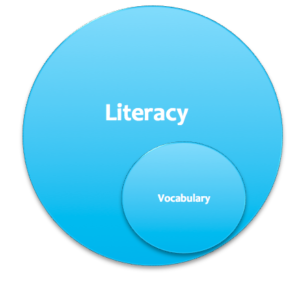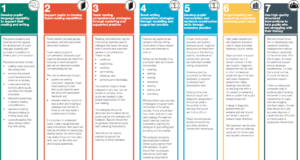There is no more important act in education than helping children to learn to read. I am sure we can agree that developing our students as confident readers, writers and speakers is the core business of every teacher, regardless of age, phase or subject specialism. Too often though we take this essential work, package it up with the label of ‘literacy’,’ then we expect a singular school leader to work miracles.
The role of the ‘Literacy Coordinator’ is a modern-day Sisyphus. Like an annual rite, we set literacy targets, compose complex plans, rattle out audits and stack up data in spreadsheets, expecting the Coordinator to push the whole-school literacy boulder up the mountain. The matter of ‘literacy’ really is a boulder of gargantuan proportions, beyond the will and wit of any individual leader.
Is it time to admit that we have as many failures than we have successes when it comes to whole-school literacy? In so doing, we may offer hope to the put upon Literacy Coordinator, crushed as the too often are by the monumental weight on their shoulders.
Geoff Barton, in his sage book, ‘Don’t Call it Literacy!‘, made an essential point. By labeling up the academic language of school and the means of communicating our curriculum as ‘literacy’, we wrongly offer it up as something extraneous, to be done in the corner of training days and to begrudgingly audit during the flagging final weeks of the summer. Instead, we should see reading, writing, vocabulary, speaking, listening, debate, and more, as the complex tapestry of great teaching, enacted in every lesson, in every phase and subject domain, by every teacher.
One key reason why whole-school literacy fails is that the construct of ‘literacy’ is simply far too big, complex and unwieldy. Consider for a moment just some of the issues that would fit under the broad umbrella of ‘literacy’:
- Reading for pleasure;
- Reading issues (such as poor decoding, weak comprehension, dyslexia, and the readability and accessibility of texts for our students);
- Academic vocabulary;
- Teacher explanations, talk and questioning;
- Improving writing;
- Improving spelling and writing accuracy;
- Speaking and listening;
- Enhancing teacher knowledge and providing training for all of the above;
- Developing parents’ knowledge and understanding of all of the above.
There you go, Literacy Coordinator…fix that. Sisyphus is reborn!
Of course, in trying to fix so many things, we actually address very little with meaningful impact. Take one of the issues above. I’ll go with academic vocabulary, as it is one of the underlying factors determining the bigger, harder curriculum that is currently a pressing need in school.
Without a proper evaluation of students’ reading abilities and vocabulary knowledge, as well as teacher confidence and competence in this regard, we may find ‘answers’ to questions we that were not essential in the first place. We need to dig into the available external evidence too, better understanding reading (one of the most awesome cognitive achievements of our species no less), before sharing that knowledge and making sense of it. We need to pilot, enact, assess and evaluation our work on vocabulary.
All of this work, just on one mere strand of ‘literacy’, takes a great deal of time, tools and training.
Another reason for the failure of whole-school literacy is that we lack the required expertise on any given literacy topic, such as vocabulary. One common failing is that we do address the best available evidence in generic terms, but we fail to address what that means for subject domains (in secondary and primary phases). It may be that teaching students an understanding of word parts (morphology) is very useful as vocabulary instruction in Science, but the same strategy may not prove as useful in History. Time to inquire about our approaches in each subject discipline is required.
We come to our failings in assessment that account for failings in our whole-school literacy approach. The domain of literacy is so wide, so complex, that it can prove hard to find useable assessments. Once more, we have to shrink the problem of literacy down to something more manageable – a focus like vocabulary knowledge – that can be reliably assessed, with some validity, to judge whether our approaches have been working or not.

In narrowing our focus, we can find good assessments of the strand of literacy we are looking to improve, thereby making the act of addressing whole-school literacy, well…less Sisyphean.
When you account for the scale and importance of each strand of literacy, the notion that any individual can ‘coordinate’ it all, particularly given the subject specific nature of much of what we term ‘literacy’, starts to appear to be quite unrealistic. To address any aspect of school improvement requires a deep, systematic approach to the work, with every teacher, middle and senior leader proving a meaningful part of the coordination. In trying to address too much in our school improvement efforts, we fail to evaluate what actually accounts for any discernible improvements.
We need to start our attempt to grapple with literacy by accessing the vast bulk of available evidence on it to help us identify the needs of our students. The recent publication by the Education Endowment Foundation – the KS2 Literacy Guidance Report (find it HERE) – offers a useable synthesis for schools to initiate their exploration into the more specific issues faced by our students:


Once we identity our issue, with good teacher judgements and deploying assessments with validity, we can leave the term ‘literacy’ behind and begin to improve vocabulary knowledge in English, or writing in History, or explanations in Science, and so on. In effect, we bring our collective weight to bear and crack the boulder in our school. We each heave our rock up the mountain and lift a considerable weight off our Literacy Coordinator’s shoulders!






Comments